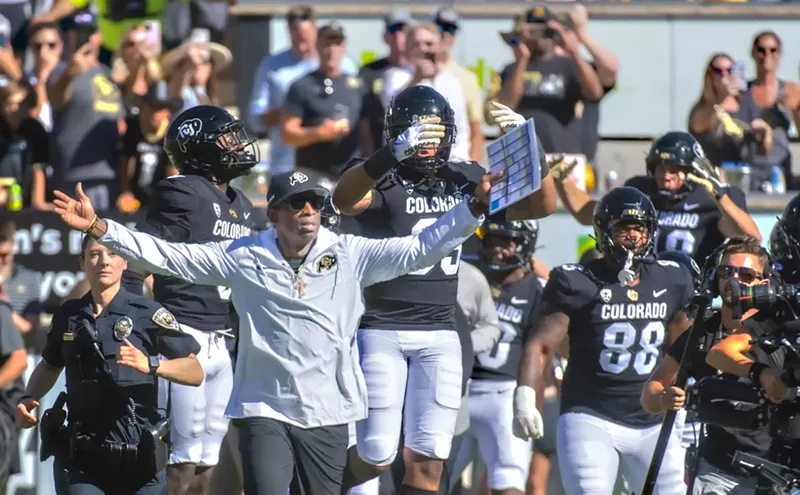"I think a lot of the words he used are code words, and that's the same kind of thing that got Trent Lott into trouble in the South," says Milton Branch, president of CU's Black Alumni Association. "Down there, they've used code words for a long time to say certain things publicly in a way that makes them seem acceptable, because they disguise what the person really means. And in this case, these code words helped to perpetuate negative stereotypes about blacks."
"It was full of subliminal messages," adds Kerry Kite, president of CU's Black Student Alliance. "They're the kinds of things that certain people don't question, because supposedly, subconsciously, they already know they're true. And that's a problem."
Views like these are at the heart of a letter signed by Branch and Kite as representatives of their respective organizations and sent to News editor John Temple on January 20. The missive suggests that Krieger and the paper for which he works "owe an apology to all the hard-working, dedicated student-athletes of the University of Colorado. We expect, at least, that, if not also an explanation of why a paper of the Rocky Mountain News's caliber and influence would choose to run such a heinous, not to mention dangerous, piece."
As of February 11, the News had printed several letters critical of Krieger's piece, but not the Branch-Kite salvo, even though Dave Plati, CU's assistant athletic director for media relations, included it in his online notes column (accessible at http://cubuffs.ocsn.com/genrel/012503aaa.html) late last month. Still, the Rocky can't be accused of ignoring their comments. Because the letter arrived at the paper when Temple was out of town attending his father's funeral, it went instead to managing editor Deb Goeken, who reacted by coordinating a February 6 get-together aimed at discussing the column. Goeken and sports editor Barry Forbis were in attendance, as were Kite, Branch and Krieger, who has a reputation for going where his peers are too timid to tread. When then-Denver Broncos running back Terrell Davis was mentioned in a trial that revolved around the Gold Club, a pricey Atlanta strip bar with reputed mob links, Krieger was the only local sportswriter to risk retribution from the onetime Super Bowl MVP by writing about it ("Stripped Down," May 31, 2001).
In a conversation that took place prior to his trip to the principal's office, Krieger had no apologies to make for his January 16 effort, describing the controversy as "a conflict between political correctness and the truth." He didn't offer any sorries after the get-together, either, but his tone was considerably more moderate. "I need to find a balance when I want to make a strong statement, so I can avoid a variety of other implications," he says.
The Krieger offering that spurred this debate concerned Marcus Houston, a running back who'd just left the University of Colorado Buffaloes in favor of the Colorado State University Rams. Houston, a graduate of Thomas Jefferson High School who entered CU as part of its 2000 freshman class, was among the most highly touted Buffaloes recruits in ages. Moreover, his extracurricular projects, including "Just Say Know," a program he created that's intended to foster academic and personal achievement among young people, earned him steady praise and status as a parent-friendly role model. But he was beset by injuries during his years at CU, and even after returning to apparent health this past season, he saw little on-field action.
Houston's extended pine time fueled speculation about friction between him and two members of the Buffaloes coaching staff: head coach Gary Barnett and running-backs coach Eric Bieniemy, who as a player was a key component of CU's 1990 national championship squad. (Bieniemy recently left CU in favor of a similar position at UCLA.) Krieger explored these issues against the backdrop of the CU football program as a whole, which made the wrong kind of news following a December 7, 2001, recruiting party at which a woman says she was raped. Authorities didn't accuse anyone of the crime, but four CU footballers received wrist slaps for drug- and alcohol-related violations. Nonetheless, the situation hasn't been put to rest. In December, the woman, officially identified as "Jane Doe," filed a lawsuit in Boulder district court that seeks to hold the university accountable for allowing sexual favors to be used as a recruiting tool.
In his column, Krieger sees the 2001 event as symbolic of the dubious ways CU attempts to lure African-American recruits to a campus and a town, Boulder, that's overwhelmingly Caucasian. But he also declares that "racial identity plays a part in this story, although you won't get any of the antagonists to admit it. At its root was a black-on-black culture conflict, all the more pronounced in the minuscule black enclave along the Flatirons." Krieger subsequently contrasts straight-arrow Houston with Bieniemy, who "twice pleaded no contest to criminal charges stemming from angry outbursts while a CU student and player. Three months after Barnett hired him in 2001, he was arrested on suspicion of driving under the influence."
This behavior was tolerated, Krieger argues, because Bieniemy served as CU's "'gateway to the ghetto,' in the pragmatic language of the recruiting game." In other words, Bieniemy identified with, and appealed to, hard-guzzling, party-hearty, Boyz N the Hood-type characters that CU wanted to attract by any means necessary. But he felt no kinship with Houston, a teetotaler who wore ties and "'acted white' by relentlessly pursuing community service." This last contention especially nettles Black Student Alliance president Kite. "When did community service become white?" she asks.
Krieger didn't try to answer this question in his column, although he presents several other suppositions. He writes that if Houston "were a drinker, he would have fit in better. If he were a pimp, he would have fit in better. If he just shut up about Denver kids getting computers and going to college, he would have fit in better. If he were a thug or a moron, he would have fit in better in the CU football program."
The paragraphs above are chock-a-block with images that make Branch's blood boil. To him, the "gateway to the ghetto" phrase implies that every African-American athlete at CU "comes from impoverished, single-parent-family, inner-city, poorly educated, violent backgrounds. And that's certainly not true. There are some athletes that come from inner-city neighborhoods, no question. But to characterize that as the only type of people Eric Bieniemy was hired to recruit, as if he didn't have any capability to recruit anyone other than inner-city black athletes, is offensive."
Branch, a 1966 CU grad whose son attends the university but isn't involved in intercollegiate sports, also believes that painting "CU athletes in general, and African-American athletes in particular -- except for Marcus Houston -- as pimps, thugs, drinkers and morons is beyond the pale." The line about "black-on-black culture conflict" strikes him as inappropriate, too, since "no one would ever say the perceived differences between Coach Barnett and Craig Ochs" -- an acclaimed white quarterback who abandoned CU months ahead of Houston -- "was a 'white-on-white culture conflict.' But because of his perception of the differences between Marcus Houston and Eric Bieniemy, he thinks saying 'black-on-black culture conflict' is fine."
Kite elaborates on Branch's theme. "[Krieger] made it into the Good Negro versus the Bad Negro. And we really don't need to go back to those days."
To Krieger, who was hired at the Rocky in 1981 and covered the Broncos and Denver Nuggets as a beat reporter before being named a columnist in 2000, this analysis misses the entire thrust of his article. "It wasn't intended as an indictment of black culture, but the athletic culture at CU," he says. "It's actually making a case on behalf of an African-American student athlete, which is why the interpretation that it's an indictment of all African-American student athletes strikes me as a little odd. The column talks about a whole slew of occurrences in the Gary Barnett era: arrests, police incidents, all kinds of things, some of which have involved black players, some of which involved white players. And I guess that's where the disconnect is. Some people take what I wrote about the conflict between Houston and Bieniemy and assume that it's the subject of every reference for the rest of the column, which it is not."
As for the allegation about racial code words, Krieger pleads innocent. He chose "pimp" as a reference to the 2001 recruiting party: "I believe that's the correct use of the term," he says. Likewise, he doesn't see "thug," "moron" or "drinker" as applying only to African-Americans, since they can be used to describe individuals of all races. And "gateway to the ghetto"? According to Krieger, "There is no question that, in the big-picture world of college football, prominent white coaches require the help of black assistants with a background in the inner city to relate to inner-city recruits. That is a fact, and if people object to that being pointed out because it's politically incorrect, I don't know what to do about it -- because my job is to try and tell the truth about what's happening."
Such explanations don't convince Kite -- "As people of color who've dealt with racism and classism, it's easy for us to see through these things," she says -- and Krieger acknowledges that many African-American readers have communicated similar thoughts. But the responses he's received haven't been monochromatic. "The complaints have come mainly from two viewpoints, which are, it seems to me, mutually exclusive. One says I'm laying everything on Gary Barnett and trying to ruin the CU football program, and it raises no racial implications at all. And the other one is an entirely racial issue, in that it sees the column as purely an indictment of black football players." He adds, "Hearing both of these completely different criticisms of the same column makes me feel like I'm walking around in a George Orwell novel."
Fortunately, none of those attending the February 6 meeting at the Rocky describe it as remotely Orwellian. Managing editor Goeken thinks everyone came away from the approximately ninety-minute-long session "with a better understanding of each other, which was the goal, as it always is when we meet with readers. And we all agreed that race is an issue that should be discussed, not ignored or shied away from." To that end, Goeken says the original Branch-Kite letter will be printed shortly.
For his part, Krieger says the summit "reminded me of the '60s and early '70s. It was black people and white people sitting in a room talking about race and their perceptions, and being very assertive, but with no personal animosity." He agreed to disagree with Branch and Kite about the use of the "gateway to the ghetto" phrase; they feel it was inappropriate even if it's used frequently by recruiters, whereas Krieger notes, "My whole ethic is to tell the truth and let the chips fall where they may." The parties also varied in their opinion about whether "morons" and "thugs," as used in the column, left a racial aftertaste. But in Krieger's opinion, Branch and Kite "made very good arguments. And let's be frank: Nobody wants to be accused of these things. It's a tough label, particularly for someone like me, who was raised in the '60s. It's not something you want to have around your neck. So I'll definitely be informed by their criticisms, and I think there's no question that I'll shy away from provocative words that can be misinterpreted."
That's good news for Branch, who emphasizes that he never asked for a boycott of the News or specific disciplinary action against Krieger. "Our only objective was to let them know that phrases and code words were used in that article in a way that perpetuated false, negative stereotypes. We only wanted to make them aware of that and try to influence them to be aware that those words are destructive.... It needed to be brought to their attention so it won't be repeated."
Out, out, out: KNRC, a news-talk station at 1510 AM, and KLZ, an ESPN affiliate that holds the 560 AM dial position, are both fairly new players on the Denver radio scene, with neither making a substantial impact to date. But they're plenty lively behind the scenes, as indicated last week by a pair of talent departures -- one apparently voluntary, the other anything but.
On February 7, listeners to KNRC's midday show were startled when host Allan Prell suddenly, and tearfully, announced that he was making his last broadcast for the outlet. Why? KNRC program director Alan Eisenson says that when Prell helped launch the station last year, he committed only to six months on the job. This deal wasn't made public, Eisenson insists, "because we were hoping to persuade him to stay longer -- and he did stay a few months more than that. But a couple weeks ago, he said he needed to get back to his wife in Baltimore," where Prell had worked prior to inking with KNRC. For the time being, Prell's slot will be filled with syndicated gab from Atlanta's Neal Boortz, but Eisenson promises that someone "live and local" will be hired in the near future.
The circumstances that led to the disappearing of KLZ afternoon yakker Dino Costa are much uglier. On February 10, Rocky Mountain News broadcasting columnist Dusty Saunders wrote that Costa, who went on KLZ's airwaves for the first time last fall, "was fired or resigned Friday after allegations of sexual harassment by a female employee at the station -- charges Costa denies. Costa claims he resigned after station management suspended him. Several other sources say Costa was fired by owner Don Crawford Jr."
Costa, 39, could not be reached for comment. But some of the gaps in Saunders's account are filled by a February 7 article in the Denver Daily News, which had an inside track on the Costa situation: DenverRadio.net reports that KLZ and the Daily News share a building at 2150 West 29th Avenue. The paper said a temporary restraining order had been issued against Costa on behalf of a woman who also worked in the building and a police investigation was under way. The offense report, filed February 5 and directed at Costa under his given name, Ryan Patrick, speaks about several instances of alleged sexual harassment, including one described as follows: "Victim was confronted by suspect in first floor stairwell. Suspect grabbed victim by arm, pulled her into stairwell, pushed victim up against the wall and forcibly kissed victim, forcing his tongue down her throat. At the same time, suspect put his hand up victim's dress and groped victim's breast."
No charges had been filed against Costa circa February 11, but the investigation was ongoing. Presumably, KLZ's search for a replacement host is, as well, although there's no way of knowing for certain: Station owner Crawford did not return a call about the situation. But Costa didn't leave especially big mukluks to fill. On the few occasions when I tuned him in, I found him to be a chest-pounding, self-important, Jim Rome wannabe who was operating in a vacuum created by his station's lower-than-low profile. If a host barks into a microphone but no one hears him, does he make a sound?












